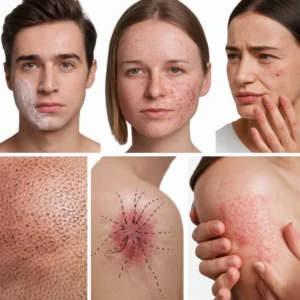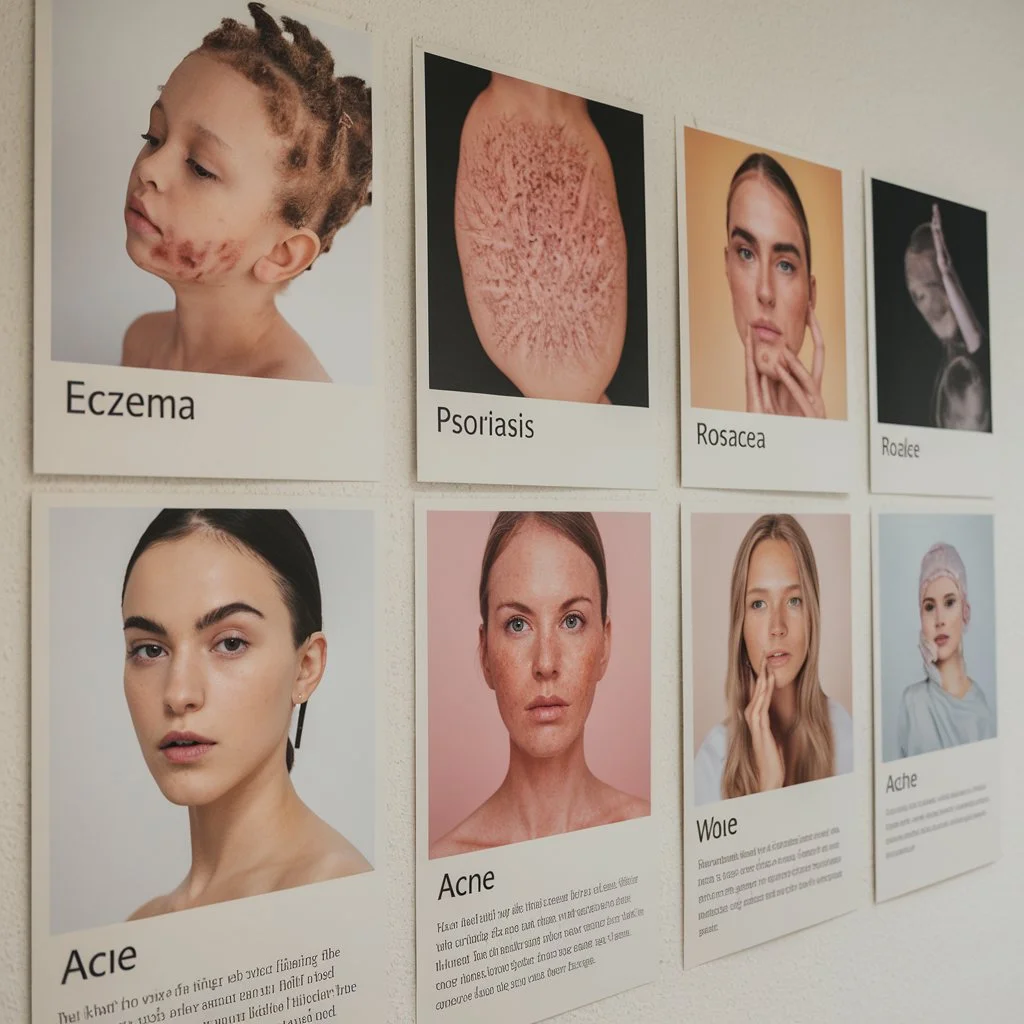Knowledge of Typical Skin Conditions
Our skin is a canvas that represents our general health and well-being in addition to serving as a barrier of defense. However, despite its significance, a lot of people suffer from a variety of skin conditions that can be upsetting and unsettling. We frequently look for explanations for the causes and symptoms of various illnesses, such as rosacea, psoriasis, and eczema. Come along as we investigate the causes of these annoying issues and provide you with knowledge to help you on your path to better skin!
Overview of Common Skin Conditions
Our skin is a reflection of our health and wellbeing in addition to serving as a barrier for protection. Still, a great number of people struggle with skin conditions that have an impact on their everyday life and self-esteem. These problems, which range from the occasional zit to long-term ailments like psoriasis or eczema, are frequently misdiagnosed and mistreated. Anyone who wants healthier skin must comprehend common skin illnesses, including their causes, symptoms, and effective treatments.
Recognizing the Different Types of Skin Disorders:
There are many different types of skin problems, and each presents unique difficulties. The most common is probably acne, which often affects teens and young adults but can even linger into maturity. It appears as cysts, blackheads, and pimples.
Another frequent ailment that can cause excruciating itching and dry spots is eczema. Allergens or irritants have a tendency to trigger flare-ups of this condition.
Different symptoms are displayed by psoriasis; it results in red, scaly skin plaques. Not only may these patches be uncomfortable, but they are also ugly.
Face redness and visible blood vessels are the main effects of rosacea. Individuals who have rosacea may have acne-like outbreaks or chronic flushing.
A rapid skin reaction that manifests as elevated welts is called hives. They can suddenly occur anywhere on the body and are frequently the result of an allergic reaction. For each kind of condition to be effectively managed, particular care must be given.
Acne
One of the most common skin conditions, acne affects millions of people globally. Though it might last into age, it usually manifests during adolescence.
This ailment shows up on the face, back, and shoulders as cysts, blackheads, or pimples. These breakouts are usually brought on by hormonal changes, which cause pores to produce more oil.
Although there is a genetic component to acne susceptibility, lifestyle variables such as stress and food also play a significant impact. Dairy products and diets high in glucose have been connected to flare-ups in certain people.
Using the right skincare products is essential for controlling acne. Soft exfoliation aids in clearing away dead skin cells that block pores, and non-comedogenic treatments stop new imperfections from developing.
Speaking with a dermatologist about recurring cases may open up more alternatives, like customized oral medicines or topical retinoids.
Dermatitis
Atopic dermatitis, another name for eczema, is a persistent skin disorder that is frequently marked by red, irritated patches. Though it can afflict anyone, children are most often affected. Dry and itchy skin is typical of the affected area.
Numerous triggers, such as irritants or allergens, can cause flare-ups. Some textiles, soaps, and even variations in the weather are frequently the culprits. For many people, figuring out these particular triggers is essential to managing eczema.
Eczema-related itching can cause people to scratch, which exacerbates the inflammation. For people who are affected by it, this cycle can make daily living unpleasant and difficult.
Many treatment approaches use topical lotions or ointments to moisturize the skin and reduce irritation. Modifying one’s lifestyle is also essential; staying away from well-known triggers can greatly reduce the frequency of flare-ups.

Rosacea
Rosacea is a long-term skin disorder that mostly affects the face. It causes redness, visible blood vessels, and occasionally acne-like blemishes. For those who encounter it, this can be rather annoying.
It’s still unknown what causes rosacea specifically. Nonetheless, hereditary and environmental cues might be important in its development. Sun exposure, spicy food, alcohol intake, and stress are common causes of aggravation.
Symptoms frequently alternate between a slight flush and a continuous redness. Some people might also notice thicker skin around their eyes or nose.
Finding personal triggers and using mild skincare techniques are usually key components of managing rosacea. Many receive comfort from topical treatments or drugs that dermatologists prescribe specifically for their requirements.
Hives
Urticaria, or hives, are skin welts that are elevated and can vary in size. They frequently emerge out of nowhere, changing form or even moving. These irritating lumps can cause discomfort and frustration.
Hives can have a variety of reasons. Outbreaks are often caused by allergic reactions to food, drugs, or insect stings. Their development can occasionally be aided by environmental variables such as temperature fluctuations or stress.
Severe itching and redness around the welts are typical symptoms. They may disappear in a matter of hours, but during the day, fresh ones may appear out of nowhere.
Hives often go away on their own in a few days without any medical intervention. However, in order to identify underlying triggers and provide symptom relief, persistent cases could need medical intervention. Comprehending your body’s reactions is essential for efficiently handling this prevalent cutaneous condition.
Skin Disorders’ Causes:
Numerous factors can lead to skin problems. Comprehending their origins is essential for efficient handling and avoidance.
A large number of skin disorders are influenced by genetics. Your family history may have an impact on your risk of getting skin conditions like psoriasis or eczema.
Environmental influences also play a significant role. Conditions that already exist or that are brought on by pollution, humidity, and climate change can get worse. It’s critical to pay attention to your surroundings.
Lifestyle decisions are also important to consider. Your skin health can be adversely affected by an inadequate sleep schedule, a poor diet, and dehydration. Another important factor that frequently goes unseen but has a significant impact on the function and appearance of skin is stress.
Lastly, skin diseases might be a symptom of underlying medical conditions. Skincare products alone are often insufficient to address the symptoms of autoimmune illnesses or hormonal imbalances.
Heredity
An important factor in the development of many skin problems is genetics. You may also be more vulnerable if any members of your family have experienced a certain condition. This genetic relationship frequently affects the probability of acquiring a problem as well as how serious it becomes.
For example, acne may run in families because hereditary factors influence the amount of oil produced and the degree of skin inflammation. In a similar vein, disorders such as eczema can also exhibit familial patterns, indicating that hereditary characteristics play a role in skin sensitivity.
Environmental Elements
Skin problems occur largely as a result of environmental factors. For example, pollution can aggravate skin and lead to the development of eczema and acne. Inflammation is a result of chemical exposure, smoke, and dust.
Our skin health is also impacted by the climate. Heatwaves and humidity can cause excessive perspiration and congested pores. Cold air, on the other hand, frequently causes flakiness and dryness.
Sun exposure is yet another important component. Over time, ultraviolet (UV) rays harm skin cells, causing disorders like rosacea or premature aging.
Furthermore, allergens found in our environment, such as pollen or pet dander, can cause breakouts of eczema or hives.
Lifestyle Decisions
Skin health is significantly influenced by lifestyle choices. Numerous skin illnesses might arise as a result of our everyday habits, diet, and level of exercise.
An inflammation-causing diet high in processed foods and sweets may be the cause. Eczema and acne are often made worse by this. Conversely, adding fruits, veggies, and good fats to your diet might help you have clearer skin.
Additionally, stress management is crucial. Hormonal changes brought on by prolonged stress may make some skin conditions worse. Regular physical activity and mindfulness exercises can improve your complexion and emotional health concurrently.
Last but not least, smoking and binge drinking lead to early aging and many skin issues. Over time, breaking these practices improves your skin’s appearance in addition to your general health. Making thoughtful lifestyle choices benefits your skin in a multiplicity of ways.
Health Issues
Skin health can be greatly impacted by medical problems. Early detection is vital since certain diseases have skin symptoms that are apparent.
For example, rashes and discolouration might result from autoimmune diseases such as thyroid illness or lupus. These alterations frequently mirror internal bodily processes.
Skin problems can also be brought on by bacterial, fungal, or viral infections. Impetigo and shingles are two examples of conditions with recognizable symptoms that need to be treated right once.
Furthermore, hormonal changes brought on by diseases like polycystic ovarian syndrome (PCOS) might result in breakouts or other dermatological issues.
For skin illnesses associated with medical problems to be effectively treated and managed, it is essential to comprehend these linkages. Knowing how your dermis is impacted by systemic health enables you to make more informed decisions about your care.
Identifying Skin Disorder Symptoms:
Early treatments for skin problems depends on the recognition of their signs. Different illnesses have distinct symptoms that can be used to find underlying problems.
The first hint is frequently physical appearance. Any redness, swelling, or uneven areas could be signs of trouble. Eczema usually manifests as dry, flaky regions, whereas acne usually appears as pimples and blackheads.
Skin sensations might vary greatly. Rashes may be accompanied by itching or burning, which indicates allergies or irritants are at work. Certain disorders result in pain or discomfort that needs to be treated right away.
Additional important signs are variations in color or texture. Psoriasis causes skin to thicken, whereas other illnesses cause odd coloration. Observing these changes enables you to keep an eye on the condition of your skin and, if necessary, seek professional care.
Modifications to Color or Texture
Our skin’s hue and texture might disclose a lot about our general health. Changes in these traits frequently point to an underlying skin condition that needs to be treated.
Dry patches or rough spots, for example, could be signs of psoriasis or eczema. Because of the potential for discomfort and irritation, it’s critical to determine the source as soon as possible.
Changes in color are also important. Redness may indicate rosacea or inflammation, whereas spots that darken in certain places may indicate hyperpigmentation problems. These differences can have an impact on one’s self-esteem in addition to appearance.
It’s important to notice how your skin changes. Getting professional assistance if you observe consistent changes in texture or color can guarantee that you receive the right care that is customized to meet your needs.
Options for Managing and Treating
Numerous solutions are available for treating common skin problems. Targeted area lotions and ointments are common topical therapies. They can fight infections, lessen inflammation, or hydrate dry areas.
Oral medicines could be recommended in more severe situations. These can include immunosuppressants for diseases like psoriasis and antibiotics for acne.
A major factor is also played by changes in lifestyle. Skin health can be supported by a well-balanced diet high in vitamins and minerals. Reducing exposure to identified triggers also helps to reduce flare-ups.
The use of alternative therapies has grown in favor among people looking for more holistic solutions. While acupuncture and herbal therapies are worth investigating, you should always consult a healthcare professional before using them.
1. Topical remedies
When treating common skin problems, topical therapies are frequently the first line of defense. These drugs are available as gels, ointments, and creams. They offer concentrated doses precisely where they are required by focusing on particular locations.
Salicylic acid or benzoyl peroxide can be quite effective in clearing clogged pores and reducing irritation in acne sufferers. Corticosteroids may help eczema sufferers by relieving inflamed skin.
An analog of vitamin D, psoriasis can be treated by reducing the formation of new skin cells. In the interim, topical antibiotics that lessen redness and pimples may be effective in treating rosacea.
It is imperative that you use these products in accordance with a dermatologist’s advice. Side effects such as increased irritation or thinner skin might result from overuse. For safety and efficacy, always do a patch test on a small area before applying more broadly.
2. Oral pharmaceutical
For the treatment of a number of skin conditions, oral medicine might be rather important. To address underlying disorders, doctors may prescribe tablets when topical treatments are insufficient.
Oral drugs like antibiotics or retinoids can help reduce inflammation and manage outbreaks for illnesses like severe acne or psoriasis. These medications frequently address the underlying cause of the issue as opposed to only masking its symptoms.
Immunosuppressants are sometimes used to treat skin conditions linked to autoimmune diseases. They function by reducing the immunological reaction that sets off flare-ups.
It’s crucial to talk to your healthcare practitioner about any possible side effects because taking oral drugs can occasionally cause unintended reactions. To guarantee safety and efficacy during therapy, routine monitoring is typically advised.
3. Modifications in lifestyle
Simple lifestyle adjustments can have a big impact on how skin problems are managed. Pay attention to your diet first. Increasing your intake of fruits, veggies, and whole grains can supply vital nutrients that promote healthy skin.
Drinking enough water is also crucial. By keeping your skin hydrated and aiding in the removal of pollutants, drinking lots of water can help prevent flare-ups.
Frequent exercise helps balance hormones that cause skin disorders like eczema and acne and encourages healthy circulation. Try to get in at least 30 minutes each day to improve your general wellbeing.
4. Alternative medical interventions
A wide range of alternatives are provided by alternative therapies for the treatment of common skin conditions. Many people look for these techniques to supplement conventional therapy or in situations where conventional drugs are insufficient.
One such method that has grown in popularity is acupuncture. Through the stimulation of particular body spots, it might aid in lowering inflammation and accelerating the healing process.
Herbal medicines are a worthwhile pursuit as well. Aloe vera, tea tree oil, and chamomile are examples of ingredients with calming qualities that can help with a variety of skin conditions.
Yoga and meditation are examples of mind-body techniques that are relevant to skincare. They can improve general wellbeing and lessen stress, which in certain cases may lead to flare-ups.
5. Self-care routines
Taking care of oneself is essential for managing skin conditions. Modest adjustments can result in big gains.
Keeping your skin clean is essential. Use gentle cleansers that match your skin type. Avoid harsh scrubs, as they can aggravate sensitive areas.
Moisturizing regularly helps maintain the skin’s barrier. Look for products free from fragrances and irritants. Opt for those rich in natural ingredients like aloe vera or shea butter.
Sun protection cannot be overlooked. Daily application of sunscreen shields against harmful UV rays, preventing flare-ups and premature aging.
Stress management techniques are also beneficial. Practices like yoga or meditation help reduce stress levels, which can trigger various skin conditions.
Preventing and Managing Flare
Taking proactive steps can significantly reduce the frequency and severity of skin disorders. Awareness is crucial; understanding your triggers helps in managing flare-ups effectively.
First, maintaining a consistent skincare routine tailored to your specific condition is essential. Use gentle cleansers and moisturizers that suit your skin type. Always apply sunscreen to protect against UV damage, which can exacerbate many conditions.
Diet plays a vital role too. Incorporating anti-inflammatory foods like fruits, vegetables, nuts, and whole grains may help improve overall skin health. Staying hydrated by drinking plenty of water also supports skin function.
Lastly, listen to your body’s signals closely. Early intervention can prevent minor issues from escalating into significant problems over time.

